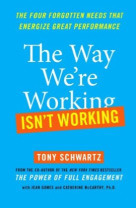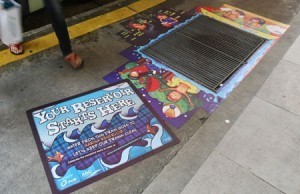Daniel H. Pink's Blog, page 24
June 11, 2010
Factoid of the day: Red, not-so-white, and blue
Haya El Nasser analyzes some just released Census data in this morning's USA Today and offers up this stunner:
Today, while 19.9% of Americans over 65 are racial minorities, 48.3% of kids under age 5 are.
Now imagine the complexion of this country 40 years from now, when (most of) those older folks are gone and (most of) those youngsters are in charge.
June 10, 2010
Whiteboard magic
Above is a remarkable 10-minute animated video about Drive. Over the past few weeks, several people who've watched it have asked me how I created such an elegant and compelling piece. Today I provide the answer: I had almost nothing to do with it.
In January, I talked about the book at the RSA in London. A few months later, the RSA carved out some sound bites, commissioned Cognitive Media to add some groovy whiteboard cartoons to accompany the words, and then posted the video on YouTube...
June 9, 2010
The peril of giving people what they want
 Give customers what they want.
Give customers what they want.
It's a sturdy principle of business, one that most of us endorse. But it's also a principle that can carry seeds of its own demise. And nowhere is that clearer than in the suddenly wild and wooly world of journalism.
As newspapers disappear and big media's business models crater, there's been a flurry of entrepreneurial activity in journalism. Many of these ventures — from new ones like Smoking Gun to remade ones like The Atlantic — are inspired. Others, well,
June 1, 2010
Solving your personal energy crisis
 For all the talk we hear about "work-life balance," it sure doesn't feel like life is getting any easier or work less stressful.
For all the talk we hear about "work-life balance," it sure doesn't feel like life is getting any easier or work less stressful.
Tony Schwartz's new book, The Way We're Working Isn't Working, looks at the four basic needs all human beings share once the bare necessities of survival have been met: the need for physical well-being, emotional stability, self-expression, and meaning and significance. When these needs go unmet, the result is stress, a bigger waistline, and a lot less satisfaction.
A...
May 23, 2010
Do commissions motivate or demotivate salespeople?
 That's the question I examine in my new monthly business column for the Sunday Telegraph of London, which debuts today.
That's the question I examine in my new monthly business column for the Sunday Telegraph of London, which debuts today.
In the piece, which takes about four minutes to read, I describe the experiences of two companies — Red Gate Software in Cambridge, UK and System Source in Baltimore — that have eliminated commissions for their sales force . . . and seen sales increase.
It's a bit weird. But once you understand the logic of these companies' founders, it actually makes a lot of sense.
Factoid of the day: The myth of the left-wing Boomer
"In 1972, more boomers voted for Richard Nixon than for George McGovern. And in 2008, boomers were split evenly between Barack Obama and John McCain."
(Source: NY Times, 5.23.10)
May 18, 2010
Signage that shocks
Most of the time around here we highlight signage that we consider emotionally intelligent — that is, signage that either encourages empathy on the part of the viewer or demonstrates empathy for his or her situation.
But sometimes signage can be simply emotional. It can shock and awe us into thinking — and occasionally into action. Below are two examples of those kinds of signs.
The first comes from the Washington, DC, subway, where eating is prohibited. (Believe me: I've been riding the
Look up, Mr. President. Seriously. I beg you. Look up!
May 13, 2010
Emotionally intelligent drainage
 From Singapore comes something new: Emotionally intelligent drain covers.
From Singapore comes something new: Emotionally intelligent drain covers.
To discourage people from littering and to beautify shared space, the Asian city-state is turning its drain covers into small works of art. "On average 14 tonnes of rubbish enter Singapore's reservoirs daily," reports ChannelNewsAsia.com. Much of it comes from stray bits that people think are harmless but that can actually make their way through the drain into the waterways.
"Through this project, we hope they will think ...
May 6, 2010
Factoid of the day: Whoa, mama
1990
Number of U.S. births to mothers under 20: 533,00
Number of U.S. births to mothers over 35: 368,000
20008
Number of U.S. births to mothers under 20: 441,000
Number of U.S. births to mothers over 35: 603,000
Yes, according to the Pew Research Center and reported in today's Washington Post, in the U.S. there now more "older" women giving birth than teenagers. In 2008, 14% of U.S. births were to older women and 10% were to teens — almost an exact flip in the percentages in 1990.
That's big (and g...




